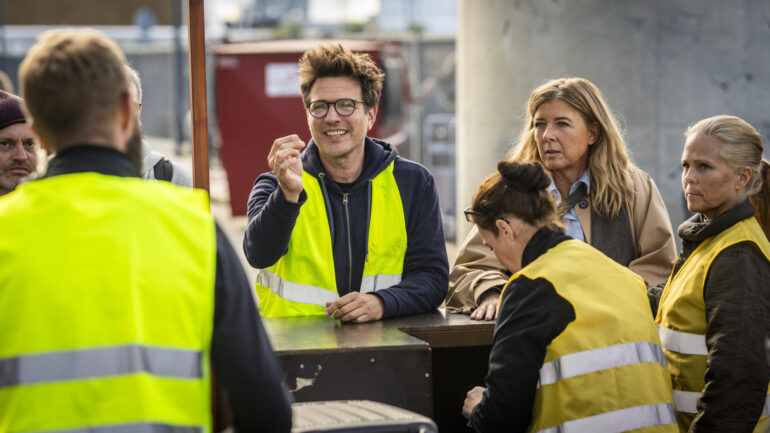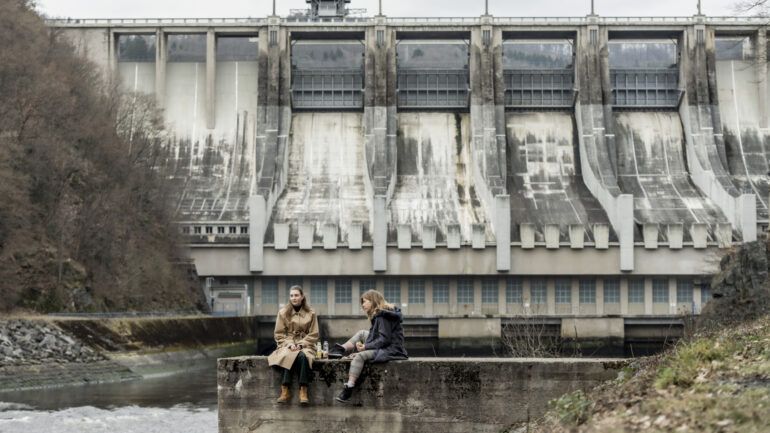Written by: Jan Lumholdt
05.09.24
Committing his TV series debut, Thomas Vinterberg literally floods the whole of Denmark in a seven-part epic saga. The Venice launch of Families Like Ours also instantly places him in outstanding historical company.
“Seriously?! If so, this makes me very, very happy!”
Thomas Vinterberg is the greatly acclaimed Danish director who sent Cannes into an unforgettable state of shock and euphoria with his Dogme film The Celebration (Festen) in 1998. Ever since, he has provided the top film festivals with top quality cinema, of which his 2020 Another Round (Druk) received that year’s international Oscar. Somewhat surprisingly, he has never played the Venice film festival. Up until now, that is.
Families Like Ours (Familier som vores) – Vinterberg’s debut in the series format – written by himself and Bo Hr. Hansen – is a grand saga of a near-future Denmark facing complete uninhabitability due to rising sea levels, leading its entire population into home- and statelessness within about six months. At the centre is 19-year-old Laura and her fairly typical modern Danish family – dad Jacob, mum Fanny, uncle Holger, dad’s new wife Amalie, Amalie’s brother Nikolaj, Nikolaj’s husband Henrik, and Elias, Laura’s new-found boyfriend and first great love. Together with about six million compatriots, they will have to bid their country farewell, being relocated to unforeseen new destinations such as Romania and Bulgaria. Due to the escalating flow of refugees, the borders of France, Germany and not least the Nordic countries are all being closed to Danish immigrants. Dramatic drama, existential crises and assorted harsh ordeals await our family in this seven-part epic of nearly as many hours.
Main producer of the series is Zentropa Entertainments via Sisse Graum Jørgensen and Kasper Dissing, together with TV 2 Denmark, StudioCanal and Canal+, with co-production by Film i Väst, Zentropa Sweden and Lizette Jonjic, Sirena Film, Ginger Pictures and Saga Film with support by DFI, the EU and Nordisk Film & TV Fond. World sales are handled by StudioCanal.
With its Venice world premiere, Families Like Ours joins a tradition, both impressive and pioneering, as this festival like few or none before it has programmed visionary TV series in their entirety on the big screen – and well before our current streaming age. Rainer Werner Fassbinder’s Berlin Alexanderplatz (1980), Ingmar Bergman’s Fanny and Alexander(Fanny och Alexander, 1983), Edgar Reitz’ Heimat (1984), Lars von Trier’s The Kingdom II (Riget II, 1994) as well as The Kingdom Exodus (Riget Exodus, 2022) have all met their virgin audience here, and then flown out into the world, often heading for greatness, on occasion immortality. In other words, Vinterberg is in outstanding company, even an instant part of TV history, and even he himself gasps at the mention of especially one of the titles.
“Seriously?! Fanny and Alexander?” (Yes, seriously. Many of the main cast members were in attendance, even, quite out of the blue, Bergman himself, who sailed in for a few hours and then sailed off again, back to Sweden and his own preferred bed-linen).
“Fanny and Alexander is my favourite work of all and everything out there. I did not know it was first shown in Venice. To get to hear this right now makes me very, very happy!”
Vinterberg, “still as nervous during a premiere as when Festen opened, in doubt of whether it’s too long, too dark, too this, too that”, has just presented his work to its gala audience. Tears, shouts and long, warm standing applause strongly suggested that he and his team-mates were onto something, had hit a nerve, done their job well.
He is also happy with the procedure. His renowned predecessors of the previous century were, at least partly, given greater freedom than today’s series creators – let’s call it “old school handmade” vs. “new school industrial”. Vinterberg is not in any doubt regarding his own experience of the journey. It’s all been figured out.
“Families Like Ours is decidedly old school. I was given the same budget per minute as I would get for a regular feature film. The way we’ve financed it, via the Danish Film Institute and the TV 2 and Canal+ networks, consciously avoiding the streaming networks, has ensured us full ownership and financial revenue. So we’ve basically done what Ingmar and the others did back then, approached it the same way – as a film, a great narrative, and not like – snap, snap, snap – a string of episodes. Well, I did put in some cliff-hangers, but first and foremost, it’s one long film, just stretching out before you.”
Collaborations with both TV 2 Denmark and Studiocanal have been highly fortunate, he reports.
“They’ve given me full creative and artistic freedom. Studiocanal, being French, is a naturally auteur-driven operation, and TV 2 have likewise been very generous, never attempting to exercise any control. The only thing that’s been very rigid, and to me different, is the exact number of minutes you just have to get exactly right per episode, not too long, not too short. That’s been hard, and a limitation to me. Some moments that I rather liked have had to go. On the other hand, my original six-episode script has been turned into seven filmed episodes.”
The handpicked cast reads like a veritable who's who of Danish acting talent since decades back. Several, like Paprika Steen, Thomas Bo Larsen, Magnus Millang, Albert Rudbeck Lindhardt, Max Kaysen Høyrup and HeleneReingaard Neumann, ****are well-established members of the Vinterberg “stock company”, some of them going all the way back to the director’s debut The Biggest Heroes (De største helte) in 1996. Others, like Esben Smed, David Dencik, Asta Kamma August and Nikolaj Lie Kaas are making their Vinterberg debuts. Brand new in every sense Is Amaryllis August, who, in her first ever screen appearance, carries the weight of playing Laura, the centre and, if you will, heart of the whole saga. “She’s just here to stay,” is Vinterberg’s confident assessment in view of August’s performance.
Reading like a just as veritable what’s what of the Danish film wonder these latest 25 years is the résumé of Zentropa producer Sisse Graum Jørgensen, sporting reoccurring director names like Niels Arden Oplev, Lone Scherfig, Anders Thomas Jensen and Susanne Bier. Her Vinterberg journey spans over almost 20 years, back to Dear Wendy (2007) and from there on onto The Hunt (Jagten, 2012), The Commune (Kollektivet, 2016), and most recently Another Round in 2020. With one exception, the 2009 series The Left Wing Gang (Blekingegade, directed by Jacob Thuesen), her filmography as main producer exclusively contains “classic” features. Which, in many ways, you could also view Families Like Ours as, she feels.
Vinterberg first started thinking about the idea in 2017, and from 2019 on the process started, “ever so loosely”, Graum Jørgensen recalls. “Thomas felt that this story would require some more minutes than the one hundred or so of a regular feature-length. Here, some more space was needed in order to stretch out. I don’t think, however, that he ever thought ‘Ah, now I’ve made films, it’s time for a series’. It’s more about which format is the right one for this particular story. And I think we made the right decision.”
“But we have produced it just like a film,” notes Graum Jørgensen, in Venice together with fellow Zentropa producer and executive producer of Families Like Ours Louise Vesth, who herself produced the most recent Venice-playing Danish series, 2022’s Kingdom Exodus – where Sisse Graum Jørgensen in her turn acted as executive producer.
“At the press conference presentation it was emphasised that this is indeed a film, a work,” Graum Jørgensen continues. “I see that as a true acknowledgement. Also, as far as I’m aware, only Venice out of the big A festivals will present a series in its entirety, not just the first two episodes. They will take the time that’s needed. That’s really nice, and beautiful.”
The notion of screening Families Like Ours on some selected regular screens, say across Denmark, is certainly a contemplation, not least with Vinterberg himself, who could envision a two-part experience with four plus three hours in the cinema theatre. Market realities, however, will want things differently, Louise Vesth reminds us.
“The quality level today when it comes to series, and in every way this series, is very high. And the financial backing that’s needed to maintain such a quality comes from players and platforms which make their living showing these series on home screens. If the first “life” of the work is selected for the cinemas, the business model won’t work out for them. A screening at an event like Venice is different, it’s a fantastic enhancement of the production as a stand-alone work, but as producers of Families Like Ours and Kingdom Exodus, we are dependent on our partners the likes of Canal+, TV 2, DR and Viaplay.”
Families Like Ours will get its TV 2 Denmark premiere 20. October, with the other Nordic countries soon following suit. France, Germany, Poland, Benelux and The Czech Republic are also among the confirmed territories, with others underway.
The thought of a possible second season – some situations in the story do open up for it – has not yet entered Sisse Graum Jørgensen’s mind. “We haven’t talked, haven’t even started thinking about such a thing. But it’s certainly an inspiring remark.” Adds Louise Vesth: “At least the Copenhagen City Hall is still above sea level. Perhaps we can drown it entirely in season 2?”
As for Thomas Vinterberg himself, he confirms that he does not have a story. At least not yet. “ But I would very much like to spend some more time with these people.”

